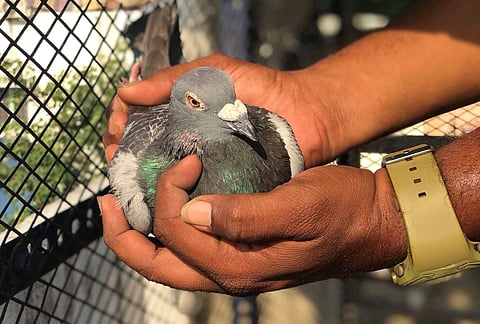

On February 23, 1942, Winkie, a homing pigeon, flew 120 miles across the North Sea back to her home base. She had brought precious information on her companions from a Royal Air Force bomber which had crashed into the sea. On her arrival, her caretaker informed his colleagues at the base and the crew was rescued within 15 minutes. The story was reported by the BBC.
While homing pigeons have been turned into military assets, their earliest use was in sports, specifically racing, maybe as long ago as 220 AD. Pigeon racing remains popular to this day including in several parts of India like Chennai where it’s a passion for more than 800 people.
OP Vijayakumar, 55, the secretary of the city’s Royal Pigeon Society, is also the owner of approximately 35 pigeons and a two-time racing champion. He points to a smaller pigeon loft on the roof of his apartment building, with around 10 pigeons fluttering inside, and says, "That's my son's loft of pigeons. He's studying law in VIT but I know his passion lies in pigeon racing."
The sport is not reserved only for the rich, unlike other animal races. For Vijayakumar, his son Rahul and many like them, pigeon racing is more than just a hobby. "My grandfather did it, my father did it, I do it and now my son does it. It's a hereditary passion," he says.
He talks about his pigeons as if they are exquisite handcrafted machines. It's not the same attachment that one would feel to a dog. "It's a matter of prestige. It’s all about whose bird flew the farthest and whose returned," he says. Maintaining this prestige costs him around Rs 1.5 lakh per year including food and medicines.
Homing pigeons were brought to India back in the early 1900s by a British pigeon fancier. The pedigree birds were bred with domestic breeds to create a lineage of birds that now spend their lives training for races.
Success in racing depends hugely on how the birds are bred -- the closer they are to the pedigree breed, the better their chances of winning or at least returning home. Every year, almost 400 birds participate in 200 km, 500 km and even up to 1500 km races, of which sometimes only 10 return.
The pedigree birds use magnetoreception -- a sensory system that allows them to use Earth's magnetic field to draw regional maps according to altitude, direction and location. And when they are bred with the domestic ones, some don't necessarily inherit exceptional magnetic abilities.
There are also other reasons for birds not returning home. “Owing to the many disturbances in the sky these days, it’s more difficult for them to navigate. Dish TVs and network towers disturb their flight patterns marooning them mid-race," says Vijayakumar.
In the scruffy roof of his building, he keeps up to 10 pedigree birds that are used only for breeding purposes and 30 racing birds. The dry months of the year starting from January to May is when they train and race. The rest of the year is reserved for breeding.
During the breeding season, he trains the fledgelings for around 5-6 hours a day. He keeps them in a cage outside so that they can study the environment and familiarize themselves with nearby buildings. In six months, they will be ready to circle the locality and get back.
Pigeon racing is not lucrative because the prize money is usually a meagre Rs 3000. But Vijayakumar sells his homebred homing birds for up to Rs 15,000 in local markets.
The sport is legal, but laws are occasionally broken like when around 50 pedigree pigeons were smuggled into India by a British man in 1982.
The pigeon fancier recalls excitedly that an egg of a Cattrysse, the best homing pigeon-strain-carrying breed, was brought to Bangalore in 1984 and bred. "It wasn't smuggling, it was done purely out of love," he chuckles.